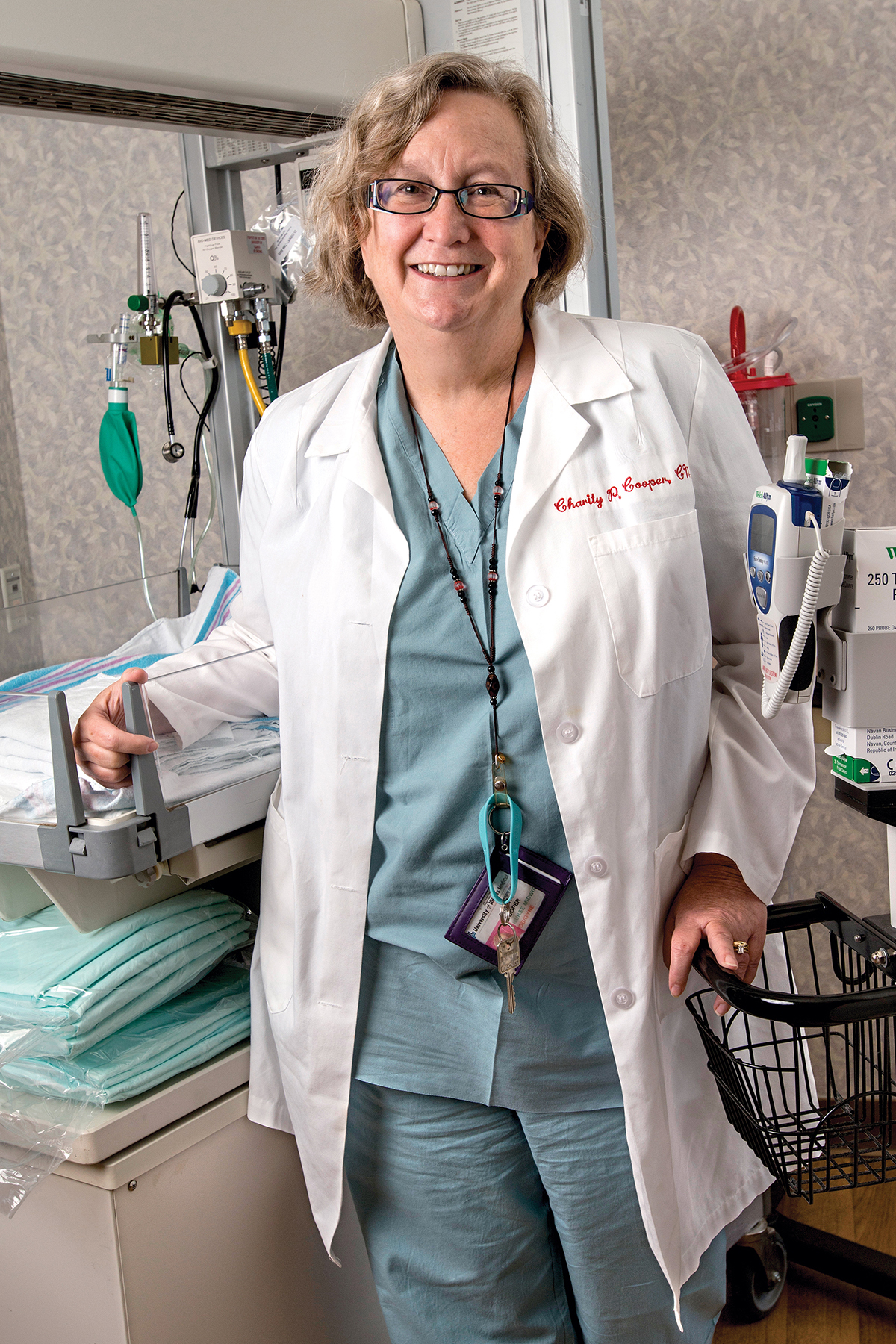Nurse-midwife delivers positive birth experience to new moms

After helping deliver more than 1,500 babies, “there’s very little I haven’t dealt with or seen,” says nurse-midwife Charity Cooper. Photo: Lloyd DeGrane
By Rachel Farrell
Reprinted from UIC Alumni magazine
Inside a delivery room at the UI Hospital, Meg Pickel was in labor and extreme pain — so much pain that she was convinced she was dying.
“You’re not dying,” her midwife, Charity Cooper, told her. “You’re doing just fine, honey.”
Cooper coaxed Pickel to change positions and coached her through the contractions, even as the expectant mother screamed for pain medication. “We can get you those drugs if you really want them,” Cooper said. “But the best pain relief is to push that baby out.”
Cooper wasn’t just showing tough love to Pickel. The midwife knew Pickel had planned to deliver without medication, so she encouraged Pickel until she gave birth to her son, Quinn.
“Charity’s support empowered me to have the delivery I wanted all along,” recalls the new mom, a 2013 master’s of public health alumna.
Enabling women to have the birth experience they want is precisely what Cooper strives for as a certified nurse-midwife. Since 1978, when she graduated with a master’s of science in nursing from UIC, she has delivered more than 1,500 babies at Chicago-area hospitals such as Rush University and UI Hospital.
“There’s very little I haven’t dealt with or seen,” the 62-year-old says from one of the bright exam rooms at UI Hospital’s Center for Women’s Health. Cooper works there alongside some 15 other midwives in what is the largest nurse-midwifery practice in the Midwest. Each year, they perform approximately 30 percent of hospital deliveries, with a Caesarean section rate of 11.7 percent — far below the national average of 32.8 percent.
According to the U.S. Centers for Disease Control and Prevention, midwives now deliver 10 percent of all babies, up from 1 percent in 1975. Home births have surged, up 29 percent between 2004 and 2009.
Despite this trend, Cooper says she’s amazed by how much remains the same in her field. Many people still don’t know midwives exist or associate them with home births, she says. They also don’t understand that midwives are trained medical professionals who provide care to women through pregnancy, labor and delivery.
“We’re the experts on normal birth, and we do that very well,” she says. “We’re not limited to an epidural and pain medication. We have a lot more stuff in our bag of tricks,” such as hydrotherapy, aromatherapy, hypnotherapy and hypnobirthing.
That approach is what drew Cooper to midwifery decades ago, when she worked for a hospital chemistry lab, hand-delivering lab reports to various departments.
“The place I was always most enchanted with was the OB department,” she recalls. “I always wanted to see the births. I thought the babies were fascinating.”
After finishing her master’s in nursing, Cooper became board certified by the American College of Nurse-Midwives, the highest level of nurse-midwifery certification.
Cooper has served at several medical centers, often caring for the underserved and underinsured. She helped run a clinic at the University of Chicago Medical Center, providing pregnant teens “with a truly individual, private birth experience,” she says. “These were young women who did not know what options existed for them and would have delivered their babies someplace fairly anonymously.”
Cooper founded the Home Birth Safety Net Program to facilitate the safe transfer of patients to hospitals should emergencies arise during home birth. Expectant mothers enrolled in the program come to UI Hospital for one OB-GYN visit, creating a formal relationship that provides a smoother transition to the hospital, should they need it.
It’s the only program of its kind in the city, but Cooper hopes other hospitals will soon follow suit.
“No one should have to travel very far to get safe and appropriate care,” she says.
